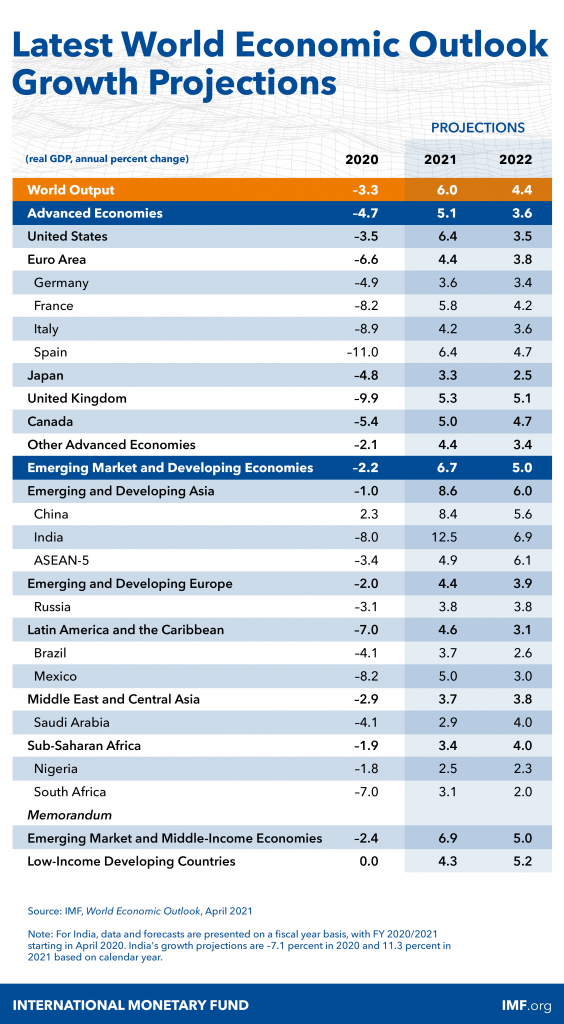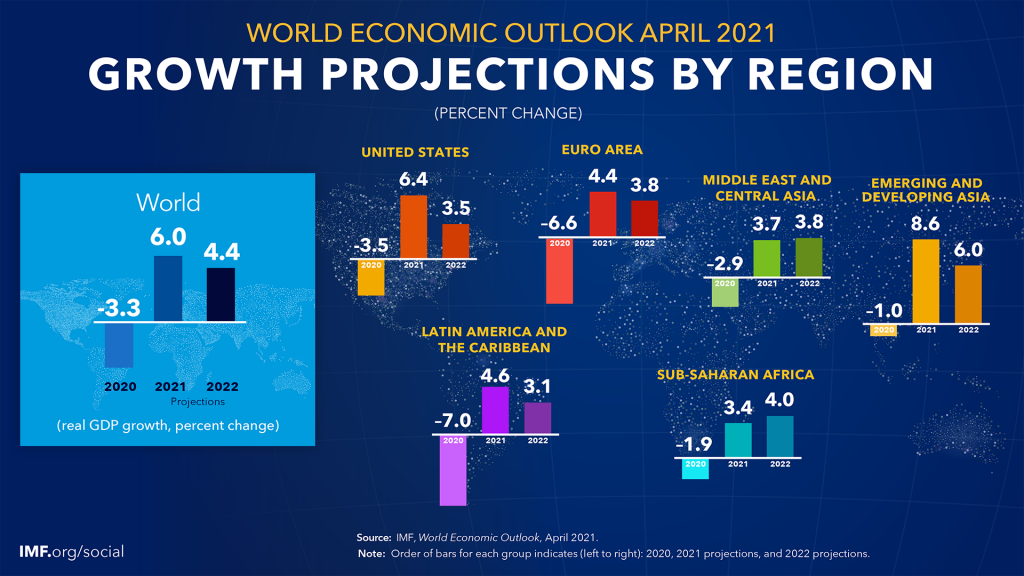As we surpass the 13-month mark of the ongoing COVID-19 pandemic, industries have learned how to cope with the virus that flipped the world upside down. Between online sales and curbside pick-up, take-out dining, delivery services, and various other innovative strategies, some industries have adapted when it comes to the coronavirus pandemic.
But some industries cannot cope with making the switch to virtual or simply offering take-out, like the entire multi-billion dollar airline industry.
The early months of 2021 sparked optimism and much-needed encouragement for global growth projections for the rest of the year and onwards. In April, the International Monetary Fund (IMF) released its biannual flagship report, the World Economic Outlook (WEO), and the international financial institution’s most recent report has been the most optimistic since the coronavirus pandemic began.
Now, keep in mind that’s not saying too much — considering COVID-19 resulted in the worst global recession since World War II — but there is light at the end of this very dark tunnel.
- More from ResearchFDI:
“New virus mutations and the accumulating human toll raise concerns, even as growing vaccine coverage lifts sentiment,” reads April’s WEO. “Economic recoveries are diverging across countries and sectors, reflecting variation in pandemic-induced disruptions and the extent of policy support. The outlook depends not just on the outcome of the battle between the virus and vaccines—it also hinges on how effectively economic policies deployed under high uncertainty can limit lasting damage from this unprecedented crisis.”
The IMF says global growth is projected at 6% in 2021, moderating to 4.4% in 2022. The WEO says the 2021 and 2022 projections are stronger than in the October report. The report’s upward projection reflects support in a “few large economies,” as well as the anticipated vaccine-powered recovery in the second half of the new year, and continued adaptation of economic activity. The IMF forewarns that “high uncertainty” surrounds the overall outlook and says the effectiveness of a return to normalization for the global economy is on the basis of a bridge to vaccine-powered normalization and the evolution of financial conditions.
Among G-20 economies, only China and Turkey registered overall positive growth in 2020. Across the pond in Europe, the European Union as a whole contracted 6.1% in 2020.

IMF
Global economic recovery will vary from country to country due to the “uneven and unfair” distribution of the COVID-19 vaccine across the globe, says UN Secretary-General Antonio Guterres. He says the possibility of the eventual vaccination across the world will diminish uncertainties “to a significant extent.”
In 2020, the global economy suffered a $3 trillion loss in terms of GDP at purchasing power parity. Guterres says that one-third of this year’s growth will go towards making up for the loss in 2020, in order to reach or surpass pre-pandemic levels.
Economic growth forecast for 2021
The IMF says economic expansion in 2021 will derive mainly from emerging markets and developing countries. Per the WEO, 156 economies will account for 62% of global growth this year. Two-thirds of the global growth for the rest of the year is expected to come from ten countries alone. The IMF says this will be the case over the next six years as well.
The US and India are expected to make larger contributions to worldwide economic growth in 2021 than their historical performances over the past two decades.

IMF
Economic recovery challenges
While the COVID-19 vaccine causes optimism, there are uncertainties that could change the course of economic recovery and growth across the globe’s economy. First, the success of the coronavirus vaccine is still early and the wait-and-see approach does leave a lot up in the air. Secondly, uneven distribution of the vaccine could cause a drag on global growth. While economies with successful vaccination programs will rebound strongly, recovery in economies with insufficient vaccination could significantly falter. Poorer countries could result in dire economic and social consequences as a result of an insufficient vaccine rollout. Lastly, pre-COVID trends (such as geopolitical risks, increasing protectionism, and ageing populations) could continue to pose challenges for the global economy.
All of these challenges will require strong international cooperation and coordination to ensure a successful rebound in 2021 and beyond.







